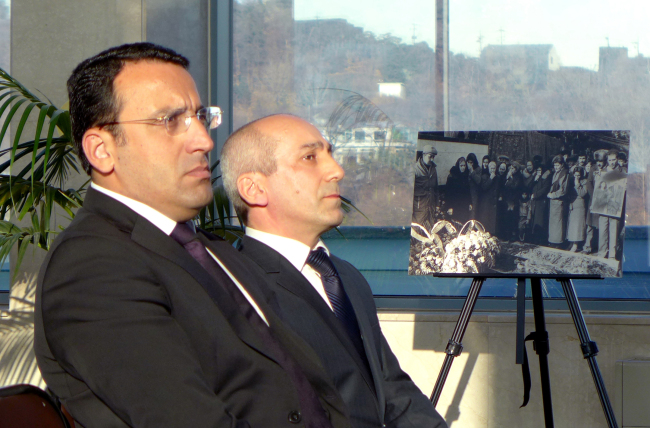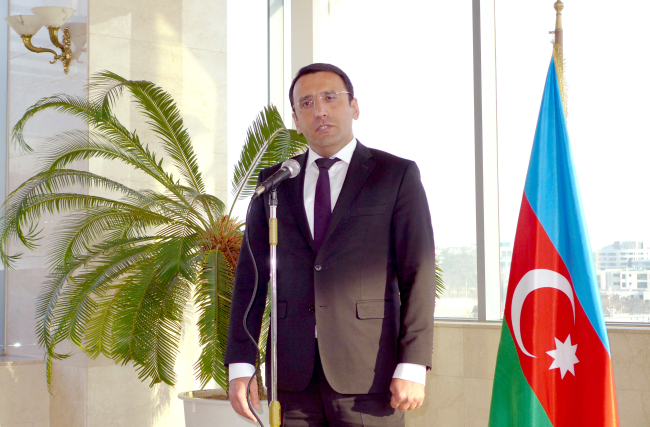The Azerbaijani Embassy held a memorial last week to commemorate the massacre that eventually sparked the country’s independence from the Soviet Union.
Known as Black January, the event annually marks the martyrdom of 137 Azeri citizens, who were killed by Soviet troops from Jan. 20-21, 1990. Armed with rifles and tanks, some 26,000 soldiers stormed the capital Baku to murder, torture and imprison demonstrators who demanded national freedom.
The bloody crackdown, enforced under a martial law decreed by former Soviet Union President Mikhail Gorbachev, proved futile, and the Azeri parliament declared independence on Oct. 18, 1991. Black January has been viewed as “the rebirth” of the Azerbaijan Republic, following its first independence declaration on May 28, 1918, after the collapse of the Russian Empire.
Gorbachev, who is widely credited with facilitating the communist bloc’s disintegration, for which he was awarded the Nobel Peace Prize in 1990, conceded in 1995: “The declaration of a state of emergency in Baku was the biggest mistake of my political career.”


“Similar to Korea’s independence struggle from 1919 (to 1945) against colonial Japan, which killed over 7,500 fighters, Azerbaijan paid a hefty price for its freedom,” said embassy counsellor Vagif Jafarov in a speech at the Hannam Tower in Seoul on Wednesday.
“Many people think that the Soviet Union fell due to geopolitical and economic reasons, but one major overlooked cause was the national aspirations of satellite states, which were violently suppressed under communism’s iron grip.”
Spurred by democratic revolutions in Eastern Europe, the outlying states dissolved the communist confederation, Jafarov noted, whose downfall was imminent from the “glasnost” and “perestroika” reforms of the late 1980s and early 1990s. The internal reforms, introduced by Gorbachev, targeted information transparency and government restructuring.
According to the counsellor, the bloodbath did not end in Black January but returned in 1991 as a full-fledged war between Azerbaijan and Armenia.
The Armenian army, backed by Russian soldiers, slaughtered 613 Azeri citizens in the town of Khojali in the Nagorno-Karabakh region from Feb. 25-26, continuing to occupy the territory that had previously belonged to Azerbaijan; 1,275 were taken hostage and 150 have gone missing to this day; and similar to the Korean Peninsula, a cease-fire agreement was signed in 1994 with no resolution to a peace agreement.
On Dec. 9 this year, Azerbaijan and Korea held its second political consultation in Baku, where Korea’s Deputy Minister for Political Affairs Kim Hong-kyun and Azerbaijan’s Deputy Minister of Foreign Affairs Khalaf Khalafov met.
Acknowledging a tenfold increase in trade volume over the last 10 years, the two sides agreed to establish the first joint economic committee this year. The two officials discussed cooperating in large-scale transportation, energy, infrastructure, construction, intelligent transportation system, health and medicine, stock market modernization, customs and distribution.
The Korean government has conducted various programs for official development assistance in Azerbaijan since 2010, covering water resource development, public administration and vocational training.
By Joel Lee (joel@heraldcorp.com)
-
Articles by Korea Herald











![[Hello India] Hyundai Motor vows to boost 'clean mobility' in India](http://res.heraldm.com/phpwas/restmb_idxmake.php?idx=644&simg=/content/image/2024/04/25/20240425050672_0.jpg&u=)








